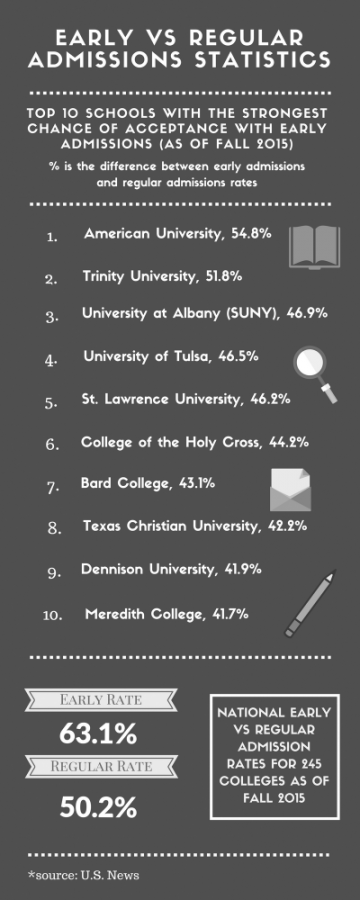Students and staff offer their perspectives on early admission
Students and staff offer their perspective on early admissions.
October 12, 2017
While underclassmen are busy with late nights and tests, seniors are scrambling to perfect their applications for the colleges of their choice. In addition to the regular admissions deadline of Jan. 1, seniors have the option to submit applications through one of the many early action deadlines.
Regular admission is the traditional admissions process that allows for students to showcase their accomplishments alongside candidates from all around the country. However, for students who know which schools they may want to attend, early decision and early action are also options they should consider.
Essentially, both of these programs provide opportunities for students to submit applications months ahead of the regular deadline. This said, with restless teenagers comes the desire for faster results, making early admissions all the more competitive.
While early action permits students to apply early to more than one college, early decision does not. If a student’s early decision is accepted, then they are required to attend that school.
Since early decision is binding, students must choose wisely before applying. Consequently, there are certain factors to take into account before making early application decisions.
“[A school you apply to early decision has] got to be a school you actually want to go to,” counselor Alice Robertson said. “A pro is [that], generally, schools like early decision applicants a little bit better, because you’re making [the] upfront commitment [that] you’re going to attend.” Robertson also points out that it is in the student’s favor when choosing colleges that admit a higher percentage of freshmen through early decision.
Statistically, applying through early decision may give students an edge in the process, but many do not like the idea of early decision because of complications with financial aid, second choice schools and more.
“I don’t like the concept of applying [for] early decision because that really puts you in one box,” senior Melanie Hillelsohn said. “If you don’t get a ton of financial aid, but you do for another school you applied to, you’re just kind of stuck in the one school you get accepted [into through early decision].”
Therefore, since early action is not binding for students, it is an attractive option for those who want to get a head start on applications without the pressure of restrictions which early decision entails. “Applying early action over regular decision generally has higher acceptance rates, making it more likely to get in,” senior Vinh Nguyen said.
Early decision generally receives less applicants because of early action’s multitude of benefits and fewer restrictions. Through early action, students are able to finish the application process sooner than regular admissions without the dedication and certainty required for early decision.
As the Nov. 1 deadline approaches, now is the time for seniors to be making important choices which may affect their futures regarding early applications.
“If you feel that you need your senior grades to show how great of an applicant you are, sometimes it benefits you to wait [for regular admissions],” Robertson said. “Generally, students applying early commit the time to writing their essays, getting letters of recommendation and [other] extra pieces during their first quarter of senior year, which can be stressful.”
Whether to apply early or not is a personal decision that requires thought and reflection based on an individual’s preferences. Each person should follow his or her own path in the process of applying for colleges especially since the college atmosphere can affect one’s overall productivity. Students of all grade levels should take time now in finding the best option for them concerning this significant choice in life.


